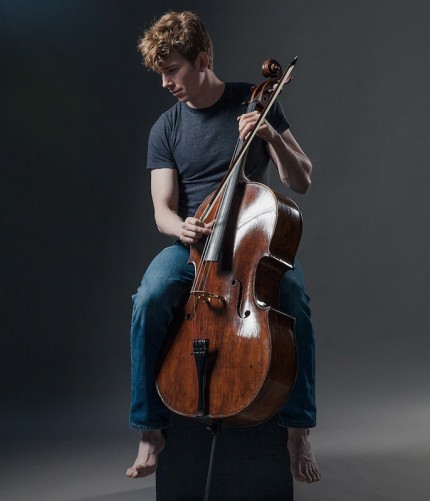Cellist Joshua Roman gives his compelling concerto a successful premiere with Illinois Philharmonic

Cellist Joshua Roman gave the world premiere of his concerto “Awakening” with the Illinois Philharmonic Orchestra Saturday night in Frankfort. Photo: Hayley Young
Too many American orchestras are currently taking a reactionary approach to programming, as if no music worth hearing has been written after Prokofiev.
So, it’s heartening that several regional ensembles are taking up the mantle, programming wider and more adventurous repertory, and commissioning new music.
The Illinois Philharmonic Orchestra opened its season Saturday night at the Lincoln-Way North Performing Arts Center in southwest suburban Frankfort with the world premiere of Awakening, a cello concerto composed and performed by Joshua Roman. Kudos to music director David Danzmayr for initiating this first commission by the orchestra and to the IPO for supporting the project and seeing it through.
The American cellist-composer and conductor Danzmayr enjoy a strong professional relationship, as was clear in the performance of Shostakovich’s Cello Concerto No. 1 that Roman played with Danzmayr and the IPO two seasons ago. In a brief introductory conversation between the two men, the 31-year-old cellist discussed composing the concerto and its origins. Though there is no direct programmatic narrative, Roman said the title reflects a personal journey of sorts, from an unhappy love affair to darkness and anger and then a reawakening with the support of others. “No one stands alone,” said Roman of the work’s inspiration.
Awakening spans about 22 minutes in five interlinked sections. A light rustling of the orchestra’s violins prefaces the cello’s entrance with hard emphatic chords. After a more amiable section, a melodic episode for the soloist leads to a strikingly beautiful lyric outpouring.
A tense confrontation between the solo cello and a solo violin (was Roman’s inamorata a violinist?) takes the concerto to a darker, more agitated place. Following a violent driving passage with aggressive drumming from the orchestra’s percussionists, a strident climax is reached and there is a pause before a long cadenza. There are echoes of Shostakovich in this extended cello solo, which segues from edgy high notes through intense struggle and eventually to a feeling of resolution and solace with the calming tones of a solo flute. The orchestra quietens and rises gradually to a pulsing Glass-like motoric section, and the concerto ends in a swirl of bravura writing for the soloist and an emphatic coda.
Awakening is a substantial and compelling work. Skillfully varied with an attractive vein of lyricism, the composer maintains interest throughout the concerto’s contrasted sections.
Less successful was Roman’s orchestration, which was capable but in places sounded awkward and rudimentary. The percussion writing, in particular, is heavy handed and far too loud. The drumming at times swamped the orchestra as well as the soloist, overwhelming the musical argument rather than punctuating it.
But these problems are fixable. If Roman revises Awakening and lightens the percussion, he may well contribute a fine addition to the concerto repertory, one that other cellists as well as himself can take up with confidence.
Roman, the composer, challenged himself as cellist at times. There were fleeting technical lapses in the heat of the moment, but Roman’s playing was largely polished, impassioned and eloquent. This is strong, attractive music and the Illinois Philharmonic could hardly have wished for a more successful result for its debut commission. Danzmayr and the IPO gave fully committed and well-prepared advocacy to this world premiere.
After a warm embrace by Danzmayr and an enthusiastic ovation by the audience, Roman came back on stage for a solo bonus. “Something I did not write,” he said by way of introduction, offering an expressive and lightly elegant rendering of the Prelude of Bach’s Cello Suite No. 1.
The Illinois Philharmonic possesses impressively warm and flexible strings yet woodwinds and brass remain less consistent. That dichotomy was manifest in Brahms’ Symphony No. 4, which closed the evening.
There were fewer horn bloopers than in past concerts, yet woodwind tuning and brass security were still sometime things. Danzmayr always seems to find the tempo giusto in whatever repertoire he directs, and the Austrian conductor proved an effective guide in this familiar score. Still, this was sturdy rather than memorable Brahms with lackluster section playing in the closing passacaglia–trombones apart–and a coda wanting in sonorous heft and cumulative impact.
The concert led off with Wagner’s Rienzi Overture. Danzmayr led a strongly projected performance that pointed up the contrasts with rich string playing in the lyrical sections and a punchy, rousing coda.